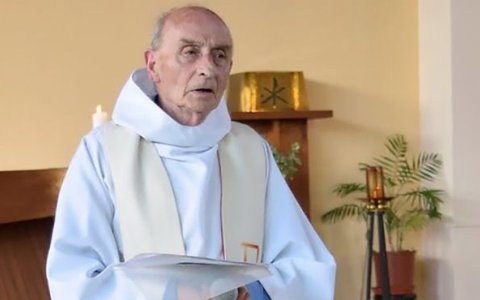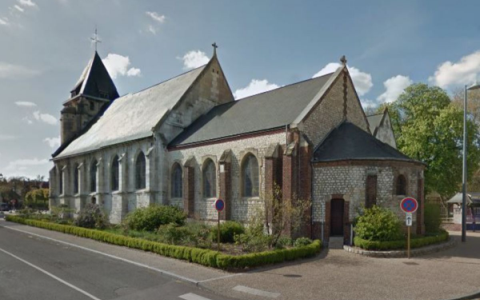ANALYSIS The French state has no category for the killing of Fr Jacques
by - 27th July 2016

THE FRENCH Catholic priest Fr Jacques Hamel was murdered yesterday by two men claiming to act on behalf of the Islamic State (ISIS). It was a religious crime in a secular state.
They forced the 86-year-old priest to his knees while he was saying Mass in the Église St.-Étienne (Church of St Stephen) in the Rouen suburb of St.Étienne-du-Rouvray, and cut his throat – some reports indicate they beheaded him.
Sister Danielle, a nun who escaped the church during the killing, told reporters his assailants filmed themselves cutting his throat and ‘appeared to preach in Arabic at that altar.’
ISIS later claimed the attack.
It was the latest in a series of terrorist attacks in France, following the Charlie Hebdo attack of January 2015, the November 2015 attack at the Bataclan concert hall, this year’s Bastille Day attack at Nice and others.
Fr Hamel was admired and loved by colleagues and parishioners as a humble man, always active, who told a fellow priest, ‘I’ll work until my last breath.’ The parish priest, Fr Auguste Moanda-Phuati, told reporters ‘He was a little like a grandfather. We were happy when he was around and worried when we hadn’t seen him in a while.’
And Sister Danielle said of him: ‘Jacques was an extraordinary priest. He was a great man, Father Jacques.’

Something of Fr Jacques’ character can be seen in this French-language video taken during Christmas celebrations in 2009.
Laïcité
For ISIS, as the group’s very name indicates, such acts of violence are religious acts, undertaken to further the establishment of their projected ‘caliphate’ or pan-Islamic state.
Yet the French public realm is secular, based on an ideology and legal system of laïcité or secularity – non-participation in religion – with its roots in the anti-clericalism of Voltaire. It was most strongly symbolized at the time of the French Revolution by the replacing of the statue of the Virgin Mary with one of the Goddess Reason in the cathedral of Notre Dame in Paris.
With the passing of a law establishing laïcité in 1905, strict separation of church and state became France’s official policy, making it all but impossible for the state to get to grips with religiously-inspired issues, or encourage interfaith outreach.
With less than half the population now claiming to be Christian, church attendance in France is now among the lowest in the world.
It thus seems ironic to the French that they should be considered ‘crusaders’ by the jihadists of ISIS, but there’s further irony in the attack being made on a priest saying Mass in a church.
Fr Alexandre Joly, priest at a nearby parish, said of the ceremony of the Mass itself, ‘It’s the moment when the priest is giving this act of love.’
Far from simply being an act of worship and remembrance, as the communion service is in most Protestant churches, the Catholic Mass is viewed by the faithful as bringing Christ palpably into their lives, the communion bread and wine they receive transformed (‘transubstantiated’) into his body and blood.
This transformation, which takes place at the altar when the priest repeats Christ’s words at the Last Supper – ‘This is my body . . . this is my blood’ – during the ceremony, makes it in the words of the catechism, ‘a banquet in which Christ is consumed, the mind is filled with grace, and a pledge of future glory is given.’
It is, for Catholics, ‘the source and summit of the Christian life.’
And if this is so for the parishioner in the pew, how much more so for the priest, who stands in Christ’s place, his hands making the gestures Christ’s hands made, breaking bread and sharing it.
Sacrifice
The broken bread of the Last Supper is the broken body of Christ, crucified by the Romans just a day later – the body of God sacrificing himself for man.
It was in enacting this ceremonial that Fr Hamel died, and his death is thus itself a form of sacrifice.
That’s why Fr Hamel’s fellow-priest Fr Mputu-Amba was able to say, ‘To leave us just as he was celebrating Mass must have been some kind of blessing for him, despite the tragic circumstances.’
That is, in part, why Pope Francis in his official comment on the event said he was ‘particularly troubled to learn that this act of violence took place in a church, during Mass, a liturgical act that implores of God His peace on earth.’
The Pope went on to say he ‘asks the Lord to inspire in all thoughts of reconciliation and fraternity in this new trial, and to extend to everyone the abundance of His blessings’. And that, perhaps, is the hardest thing for France to understand.
Indeed, true to France’s claim to be secular, President Hollande described the killing as a ‘desecration of French democracy’ – and declared ‘France is at war.’
